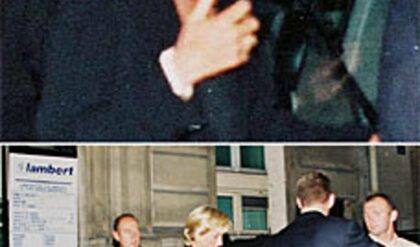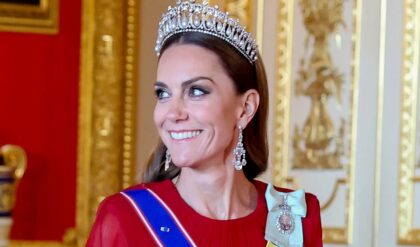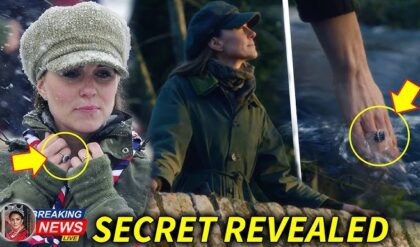Jodie Foster & Issa López on CollaborationCourtesy of HBO
When True Detective: Night Country premiered earlier this year, it became an instant flashpoint for a certain segment of the pop culture conversation. It took a once-beloved series and turned it in many ways on its head. The original series’ masculine energy was replaced with a decidedly female energy; its mysticism remained, but its source was the darkness, cold, and Indigenous mythologies of Alaska as opposed to the oppressive heat and Cajun culture of the Louisiana bayous. Much of that subversion came from the collaboration of its creator, Issa López, who also directed and wrote or co-wrote every episode, and its star, Jodie Foster.
As the show went on, it increasingly centered not the case of a group of male scientists found eerily frozen, naked, in the ice, but instead on the native woman of the area. Foster suggested ceding script pages and screen time to her Afro-Indigenous costar Kali Reis. Focus shifted to dead Indigenous women, whose cases languished. By the season’s twist ending (spoilers ahead), a group of native women who once stood on the edges of scenes not stood at its center and revealed themselves as the righteous killers avenging the deaths of their own.
López and Foster reunited back in May to revisit how their combined efforts transformed the franchise—garnering praise from some, and vitriol from others. In an Emmy season full of diverse and eclectic suite of nominees (Night Country‘s nominations include nods for Foster, Reis, costar John Hawkes, writing, directing, and Outstanding Limited or Anthology Series), what’s clear is that big swings and new perspectives are increasingly in demand. Below, López and Foster explore the power of collaboration, listening to new voices, and not listening to internet trolls.
Showrunner/Writer/Director/Executive Producer Issa López and Jodie Foster on the set of True Detective: Night Country.Courtesy of HBO
True Detective: Night Country exists as kind of the inverse of the original season of the series—not just by being female-led when the first was male-led, but also in the contrast between the Louisiana heat and sun of the first season and the Alaska cold and dark of this season. What was the impetus for this season that led to these contrasts?
Issa López: …Boredom? I think boredom is the mother of many beautiful things. Honestly, I was really sick and tired of writing projects that were based on someone else’s ideas. And I was doing a lot of that during the pandemic. I needed something that was fresh and was new and came from nowhere. And one thing that I had always been curious about was murder mysteries. I grew up absolutely insanely obsessed with Sherlock Holmes, and then I fell in love with noir cinema. And I always felt like, I wish I could do that, but it’s outside of my ability. And, and then the pandemic hit, and I had a “fuck it” moment.
So I started to look back into all the unsolved mysteries, and I ran across the “Dyatlov Pass incident,” where a group of scientist and mountaineers disappeared in the [Ural Mountains in 1959]. The circumstances were so uncanny—some explanations could explain some of the detail, but couldn’t explain others. No one explanation worked for everything. I was fascinated by this, the cold and the ice and the dark and the mystery of it all. I put those elements together and put them away the way you do with a story to let it brew. Sometimes it rots and you throw it away; sometimes it actually ferments into something beautiful. Then a few weeks later, I got a call from HBO, and they asked me what I would do with the True Detective franchise. I said, “You know what? I’ve been thinking of about murder mysteries!” And then I opened my little pot of ideas. I wanted something that could feel as remote and as ripe with possibilities for mystery, and maybe even for the supernatural, as the story of the Dyatlov Pass, but set in America. So I thought, Well, why don’t we go to Alaska? Then it all started to come together.
If Louisiana is hot and Alaska is cold, they’re still similar in so many ways even if they seem like absolute opposites. And if the characters in the first season told that amazing story about the male psyche, how can I answer that by going deep into the female psyche? So the mirror just to start to do the work for me. And I could sit back and watch it happen.
Jodie—I understand you and Issa collaborated on a few changes to your character and to the perspective of the show once you signed on. How did that process happen?
JF: I mean, it was a great first script. It was a quick yes after reading that. But then I came to Issa because I felt that I’m older than the character was written. As the script was written, it was a younger character who was fresh from having really just lost her son. So she was having a hard time keeping it together and didn’t really have her defenses in place. She was a bit of a pin cushion. And I just felt like that wasn’t the right for me.
IL: So we just pushed the character down the line in terms of her grief—not with fresh pain, but with what happens when pain isn’t treated and metastasizes into bitterness. Exploring the events that took her there was so much more interesting than what I had.
JF: The other part of the script that stood out to me was I was Kali’s character [Trooper Evangeline Navarro]. I was so intrigued by her, and by the idea of centering that native experience and allowing her to be the one to have the narrative arc that takes us from A to Z. I wanted to figure out a way to enhance and support that. And Issa says this a lot: the second that you go to the Arctic and you investigate that place, you have to recognize that a good 80% of the population are of native—Inuit or Inupiaq—descent. And that informs everything.
Jodie Foster in True Detective: Night Country.Michele K. Short/HBO
How do those kinds of creative negotiations work between a creator and an actors. Issa—you’ve called Jodie one of your heroes. Would you have been quick to take notes from someone who wasn’t you hero?
IL: [Laughs] Well, yes, she’s absolutely a hero for me. The characters that she’s created are formative to my writing and have been for a long time—especially for this project because a massive references was Silence of the Lambs. But the truth of the matter is that you listen when what’s being said makes sense. That’s what happens when you work with incredibly smart people.
JF: But we did have things we disagreed on, where I would be the one to say, “Okay, you’re right.”
IL: Jodie came back to me with absolute honesty. She said, “I love this, but it doesn’t work for me.” And I came back with, “I hear you. And these are the things that are necessary for me.” And we both saw where the other was coming from, and it just worked. Ultimately, it made the story so much more fun. The result of pushing this woman down the line of her pain calcifying is that her experience made her into an asshole. And the moment that I understood that, I knew I want to see it on screen. I want to see this terrible human being! So much of the great era of TV at the beginning of the century was related to these horrendous male characters. And it was so exciting to see a woman taking that spot.
JF: What was especially surprising was that Danvers became really funny. There was a humor that came out of her awfulness, and it kept surprising us every time it came up, when we’d be in rehearsal. Issa would ask me, “What do you think Danvers would say here?” And I’d say, “She’d say, ‘Fuck off.” Suddenly, she brought a kind of humor that none of us anticipated.
Part of Danvers’s backstory is the loss of her child. How do you explore that without falling to the trap of making her character defined entirely by either being a mother or not being a mother?
IL: The character that I initially wrote, which was not as fully cooked, was defined by this tragedy. Jodie was the one who said, “No, I think that she was already an asshole.” [Laughs]And then a tragedy happened to an asshole. So how does an asshole manage? Which is so much more interesting. It was important to say that with all the complexity of life, no single event defines you. You’re so much more complex than that. And that’s something that Jodie absolutely brought to the project.
Kali Reis and Jodie Foster in True Detective: Night Country.Michele K. Short/HBO
When you refocused the story to more center Navarro’s character, but the story seems to have always included the experiences of Indigenous women. How did you approach creating a show that is both entertaining but also respectful?
IL: In my work, I’ve directed four movies and two of them deal with missing women. This was the first job I’ve had in American TV, and while it was never my intention, it just organically became about those themes again. Because when you look at the location and the culture, and you want to explore murder or injustice, and you want it from the female perspective, what other story are you going to tell? I think that in storytelling, the most important trait that you need to nurture throughout your career is becoming better at subtracting yourself from the story. Let it evolve in front of you, and let that story tell itself.
Jodie—do you think you’d always have been so willing to not only step aside to give another actor more screen time, but to actually suggest it? Or do you think that comes from being at a certain point in your career?
JF: I think it’s just about maturing. And to be honest, it’s hard to mature when you’re inside the unreal bubble of celebrity culture, right? So there’s a lot of immaturity in that culture. When I was young, everything was about me. I liked to play a lot of solitary characters, people who don’t have many relationships with anyone else. Or if they did, those people were all dead. [Laughs] And I can understand why that was. That’s what you want when you’re trying to figure out who you are, especially within your art form. But also, that really wasn’t available to most women in my time. So when I was coming up, it felt sort of revolutionary to say, “I want to play a leading person that isn’t an adjunct to some guy.” And so that really was my path for a long period of time. But as I’ve gotten older, I’ve been more curious and more interested in relationships and what they means. And I think it’s made my work richer. Specifically, what makes me happy is that I get to learn about new voices while helping those voices with whatever wisdom I have. I guess I didn’t realize that I even had any wisdom to give!
This country has a complicated relationship with its justice system. How did you approach creating a detective drama that doesn’t necessarily glorify the justice system but rather glorifies the concept of justice itself—in the different, sometimes messy, forms it takes?
JF: That’s the tricky thing. And what Issa managed to do so beautifully is to talk about the concept of justice and how our systems have corrupted it over centuries. Certainly, if you look at the indigenous experience, you’re looking at centuries of people who have been hurt by the system, by institutions, and have had to come at justice from a different perspective. So that makes the show more complicated, because these are corrupt people, in some ways. They’ve been corrupted, and they’re having to draw their own justice system. And I loved playing that. I thought that was really worthwhile.
IL: The first season of True Detective was conceived and created and released in a world before 2016. Before Trump, before “Me Too,” before George Floyd….
JF: And before Q-Anon and all the paranoia that’s circling around.
IL: Absolutely. So we were creating a show that is supposed to echo the feelings and tones of that first True Detective—but in a very, very different world. And how do you create a show about cops trying to bring justice in a world after all of these events?
Issa López on the set of True Detective: Night Country.Lilja Jons/HBO
There’s a scene where Danvers says to the young Officer Prior, “You need to know when to stop asking questions.” It’s an integral part of the show’s endgame—when Danvers realizes who killed the scientists of the Tsalal Research Station, she stops short of answer the question that would close the case. Was that always going to be a theme of the series?
JF: I’m glad that you mentioned that moment between Danvers and young Prior. It was something that happened on set, between the actors, where we couldn’t figure something out, we were trying to cut dialogue, and sometimes what happens in those situations is that you zero in on a truth. Everything Danvers was saying to Prior was: “Ask the question, keep asking the question, keep asking the question.” And we realized that there comes a moment when you need to learn when not to ask the question. That’s ends up being her lesson to him, which is corrupt in some ways. But the larger argument for it is that the world has been fucking us over for centuries, and this is the one power that we have to save ourselves and to save the people we care about from the injustice of the institutions..
IL: It’s the classic trope: I’m telling you, but I’m really telling me. She’s telling him that he needs to learn when to stop asking questions, which is a lesson she still needs to learn too. And the end of the series is her finally learning.
The end of the series really focuses on the Indigenous women who at first seemed to exist only on the margins. And they were able to get away with murder because of it. Issa—you’re not Indigenous, but you are a Mexican woman, you are an immigrant. You’ve spoken about understanding, to a certain point, what it’s like to not be seen. Do you think that your lived experience allowed you to relate?
IL: Completely. I live in California, and you cannot have any social experience or go to any event if not for the invisible people on the edges, often people like myself who are Mexican or Latin American, who set everything up before we get there or clean it up after we leave—all without being seen, without making any noise, just so we can just into our lives. The reason that the world works is because there are people that we don’t see or hear or think about who are responsible for making the machine run.
JF: Nobody ever sees the end of the series, the whodunit of it all, coming. I’ve never met anybody who said they saw it coming, and I didn’t see it coming when I read the scripts. There’s something really subversive in that because we as an audience never saw them coming. They were in front of us the whole time, yet still invisible to us because we’re just not paying attention to them. They’re not powerful. They’re not valorized. They’re on the margins. And I think that reveals the ways in which all of us culpable for injustices that happened to native populations. But as Issa always says, their invisibility is what makes easy targets for injustice, yet they find a way to use it as their superpower in this particular story.
Anemarie Ottosen, Diane Benson, Tanya Tagak, June Thiele, Ippiksaut Friesen, and Kathryn Wilder in True Detective: Night Country.Michele K. Short/HBO
The moment when the women all walk into the frame one by one and we see them standing together, looking so formidable as a group—it’s a powerful, cheer-in-your-seat kind of moment.
IL: And you’re cheering for the murderer! Which is quite amazing, and I’m so happy we managed it. And these women, at actresses themselves, were so formidable and they inhabited their characters to such a degree that the lovely male actors playing the scientists were terrified of them.
JF: [Laughs]
IL: Those guys were in tears! And they were not actor tears! They were terrified of those women. The power that they acquired in the moment, this moment of justice for these Indigenous women, the way they rose together with such power—we were all in awe of them. They were a force of nature.
Issa—you had to deal with some pretty vitriolic reactions online. Some are from fans—specifically, male fans—of the original True Detective, and some are from, well, the creator of the original True Detective. But what I’ve noticed is that despite the aggressive tone of some of those critics, you have responded very magnanimously. Was there an inflection point in which you had to choose what your public response would be?
IL: Well, I think that you’re responsible for what you put out into the world. And if you receive an attack, you’re responsible for the way you answer. So I had to take a breath—you know, I’m Mexican, and I can get heated very quickly—and I realize that responding aggressively would only feed the fire. And I honestly believe it had nothing to do with the series itself. It’s a complicated moment of fluctuation in the gender dynamics of pop culture. So I think the response was really more about how things that worked a certain way are now changing. The original True Detective was beloved by everyone, but it also spoke to certain very male values. And then we created this version that is very female in every aspect. And that kind of thing is going to happen again, and again, and again. I mean, the movie that made the most money at the box office last year was Barbie! This trend is going to continue, and I’m only a little part of it. We’re all just expanding the possibilities of storytelling. I’m not saying that there cannot ever be another True Detective with male leads! What I’m saying is: this can also exist, and it can be fun, and we can have more.











